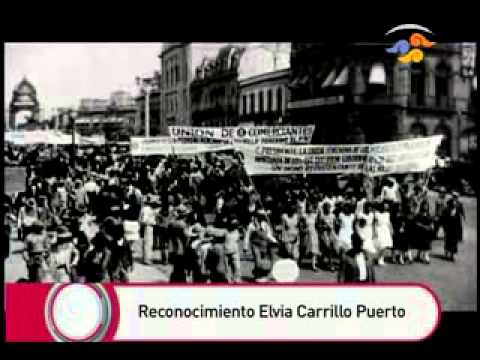The Early Life of Elvia Carrillo Puerto: The “Red Nun of the Mayab”
Born on December 6, 1878, in Motul, Yucatan, Elvia Carrillo Puerto emerged as an influential figure in Mexico’s social and political landscape. Raised in a period of great turmoil and change, her early years were marked by the echoes of the Yucatan Caste War that greatly influenced her later work. Known as “The Red Nun of the Mayab” for her fervent activism and her progressive ideas, she was part of a wave of women who advocated for gender equality and social justice in the early 20th century.
From a young age, Elvia demonstrated a passionate concern for the plight of the Mayan people and the women of her era. The Mayab, referring to the Yucatan region and its Mayan heritage, became the center stage for her lifelong mission. Her nickname, “The Red Nun,” was attributed to her unyielding spirit and relentless efforts to educate and empower the rural and indigenous communities, despite her not being a nun in the literal sense.
Elvia’s formative years were shaped by her family’s involvement in political discourse and reform. Her brother, Felipe Carrillo Puerto, who later became governor of Yucatan, was a significant influence on her views and activism. Together, they would embark on a struggle for the rights of the disenfranchised, an endeavor deeply rooted in the principles instilled in them during their early life in Motul.
Her early activism was not without significant risks. At that time, women who stepped outside their traditional roles and challenged societal norms faced ostracism and backlash. Nonetheless, Elvia braved the prevalent gender discrimination and became a beacon of hope for many, advocating for education, land rights, and health initiatives tailored for the poor and oppressed. Her work during this period laid the groundwork for the reforms she would later achieve.
Even as she navigated the complexities of early 20th-century Mexico, Elvia managed to merge the personal with the political. Her embodiment of the “Red Nun” persona symbolized a dual commitment to humanitarian causes and the political agitation necessary to catalyze change. Elvia Carrillo Puerto’s early life is not just a testament to her resilience and convictions but also to the enduring spirit of a woman who would forever alter the fabric of Mexican society.
Elvia Carrillo Puerto’s Struggle for Women’s Suffrage in Mexico
As a large-scale contributor to the feminist movement in Mexico during the early 20th century, Elvia Carrillo Puerto is a name synonymous with women’s suffrage and rights. Born in the Yucatan Peninsula in 1878, she witnessed firsthand the marginalization of women in Mexican society. It was this inequality that drove her to dedicate her life to fighting for gender equality and the enfranchisement of women.
At the heart of Carrillo Puerto’s activism was her unwavering belief in education as a means for women to gain autonomy and participate fully in society. She founded several feminist leagues, including the Rita Cetina Gutiérrez League, which provided education and fought for women’s legal rights. Her commitment to education as a tool for emancipation was pivotal in shaping the feminist movement in Mexico.
Carrillo Puerto’s efforts were instrumental in achieving the 1917 Constitution of Yucatan granting voting rights to women, a landmark victory that predated women’s suffrage in the United States. Her persistent lobbying and influence led to the inclusion of women’s suffrage in the Yucatan constitution, making it one of the first states in Mexico to recognize this fundamental right.
Yet, her struggle was met with fierce opposition and personal danger, underscoring the societal resistance to change. Despite the significant progress she made, Carrillo Puerto’s journey was fraught with challenges, including political persecution and the tragic assassination of her brother, Felipe Carrillo Puerto, who was also a staunch advocate for social reforms. Her bravery and relentless struggle serve as a testament to the enduring fight for equality and the role of indomitable spirits like hers in shaping modern Mexico.
The Legacy of Elvia Carrillo Puerto and Her Impact on Mexican Society
Elvia Carrillo Puerto, known as “The Red Nun” for her fiery activism and commitment to social justice, has left an indelible mark on Mexican society. Born in 1878 in the Yucatán Peninsula, she was a champion for women’s rights at a time when such advocacy was met with fierce opposition. Her relentless efforts resulted in significant strides in gender equality and education for women. Carrillo Puerto’s work, especially in the realm of suffrage, paved the way for Mexican women to gain the right to vote in 1953, long after her untimely death. Her dedication to this cause showcased the perseverance necessary to overcome institutional barriers against gender parity.
Among her numerous accomplishments, Carrillo Puerto founded feminist leagues that proved instrumental in advancing women’s social and political rights. Her vision extended beyond the ballot; she also fought for women’s access to education and reproductive healthcare. These leagues not only educated women about their rights but also provided practical support and resources in a society that was traditionally patriarchal. Elvia’s influence was not limited to gender issues—she was also a passionate advocate for the poor and the working class, earning her widespread respect and amplifying her impact across various sectors of Mexican society.
Today, Elvia Carrillo Puerto’s legacy is celebrated throughout Mexico and her name is synonymous with the struggle for gender equity and social reform. Educational programs and feminist movements continue to draw inspiration from her life and work. While the fight for equality and justice remains ongoing, Elvia’s story exemplifies the critical role of determined individuals in effecting societal change. As a result, generations of Mexicans, particularly women, owe a debt of gratitude to Elvia Carrillo Puerto for her role in shaping a more egalitarian and fair society.
Exploring the Historical Sites Associated with Elvia Carrillo Puerto in Mexico
Elvia Carrillo Puerto, known as “The Red Nun of Mayab,” is a figure whose impact on Mexican history is deeply entrenched in the struggle for women’s rights and social justice. Her legacy is inseparable from various historical locales throughout Mexico, where she led a life of activism and progress. Adventurers with a passion for history can trace her footsteps and gain a profound sense of the change she championed. Here, we highlight several significant sites that encapsulate her story and the spirit of her life’s work.
Born in 1878 in Motul, Yucatán, Carrillo Puerto’s hometown is a must-visit for any history buff. The Elvia Carrillo Puerto Museum, located in the heart of Motul, is set within the house where she was born and provides an intimate glance into her early life. Visitors can explore exhibitions showcasing personal artifacts, original writings, and photographs that depict the socio-political environment in which she was raised and began her journey towards activism.
The Hacienda Kankabchén, situated not far from Merida, Yucatán, is another site of historical importance. It was here that Carrillo Puerto, alongside her siblings, established a school based on socialist principles during the tumultuous times of the Mexican Revolution. The hacienda now stands as a testament to her dedication to education and social reform. Although the estate has since been converted into a private venue, guided tours are often available upon request, allowing visitors to walk the very grounds where Elvia once propagated her pioneering ideals.
Merida, the vibrant capital of Yucatán, is home to several landmarks which commemorate Carrillo Puerto’s life and accomplishments. The Palacio de Gobierno features murals by Fernando Castro Pacheco, one of which tells the story of the socialist movement in Yucatán, including Elvia’s role in it. In addition, the Monumento a la Bandera in Parque de La Mejorada, one of Merida’s many picturesque parks, stands tall as a tribute to the social struggles she was part of, symbolically connecting visitors to the intense passion and drive of her era.
Finally, the city of Izamal, with its striking yellow convent and cobblestone streets, is another pivotal site. Known for its large indigenous population, Izamal was at the heart of Elvia’s campaign for indigenous rights and women’s suffrage. The Centro Cultural y Artesanal is a cultural space that honors her effort to empower the local Mayan communities. While Izamal offers a plethora of cultural experiences, understanding Carrillo Puerto’s influence adds a rich layer of historical significance to any visit to this magical town.



